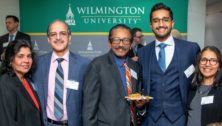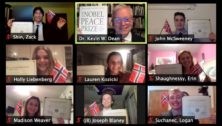Remembering Dr. Martin Luther King

By Ken Knickerbocker
Last week was Martin Luther King Jr.’s birthday. Born in 1929 in Atlanta, Georgia, had he not been felled by an assassin’s bullet 0n April 4th, 1968, Dr. King would have been 87 years old this year.
When he was alive, I was not a fan of Martin Luther King. That’s not to say I didn’t like Martin Luther King. In actuality, I was aware of Reverend King having seen him lead off the day’s news coverage on the 6:30 national news broadcast. I knew in my childishly simple way that wherever he went, trouble followed. I knew the adults in my life had opinions about him, almost none of them good.
I was just a kid as Dr. King rose to prominence and became the face of the country’s Civil Rights struggle. I was a kid focused on playing wiffle ball in the vacant lot next door and riding bikes with my friends to far away places like Darby and Clifton Heights. I was way too young to be concerned about national politics or the distant rumblings about civil rights, whatever that meant.
Awareness is what my parents asked of us kids. When the Cuban missile crisis threatened in 1962, my father drove us by the jet fighters at full alert at the Philadelphia airport just in case war with the Russians broke out. When President Kennedy was shot in 1963, my parents took us to Washington and made us stand along Pennsylvania Avenue as the horse-drawn caisson carried the president’s body from the While House down Pennsylvania Avenue to the Capital Building to lay in state before being buried the next day. In March of 1968 my mother took my older brother and I to Darby to meet Bobby Kennedy who had recently declared his candidacy for the President of The United States.
Awareness is what my parents asked and fostered in their children. Awareness.
As we drove to the doctor’s office on April 4th 1968 the reporter reading the news on KYW, Philadelphia’s all news radio station, broke in with a news flash that Martin Luther King had been shot and killed on a hotel balcony in Memphis, Tennessee just an hour earlier.
The news stunned my parents and they spoke about it as the three of us traveled the few miles down McDade Boulevard to Ridley Park where our family doctor had his office in the basement of his home. We we’re the first to tell, what I thought would be sad news, to the doctor.
A national figure, a man in the news every night, a leader, a father and husband had been shot and killed. Surely our doctor wanted to hear the news. Filling him in on the details, the few we knew of from listening to the radio, the doctor’s only response, the only one I remember anyway is, “He had it coming.”
The picture of that otherwise kind, gentile doctor uttering those condemning words is frozen in my memory. I’ve since come to appreciate the man named Martin Luther King, Jr. better. I appreciate the fact he attended college in neighboring Delaware County. I’ve read Dr. King’s writings and have come to appreciate the power of both the spoken and written word through his sermons and letters. I’ve even come to appreciate him as a human being, full of the weaknesses and foibles that befall most of us.
But when I think about Martin Luther King today, it is his speeches that make the man. Sure, there’s the ”I have a dream” speech delivered on the steps of the Lincoln Memorial in front of thousands in August of 1964. Everyone remembers that speech for it power, forcefulness and vision. That was an important speech to be sure.
 But my favorite MLK speech, that in my mind speaks to the man Martin Luther King saw himself as and who he really was, is a speech he delivered to his Atlanta congregation two months to the day before he was killed.
But my favorite MLK speech, that in my mind speaks to the man Martin Luther King saw himself as and who he really was, is a speech he delivered to his Atlanta congregation two months to the day before he was killed.
Titled “The Drum Major Instinct,” Dr. King enlists the help of the scriptures, specifically the Book of Mark, to teach that man’s primary responsibility is not to be first, not to gather distinction, not to be out front like a drum major leading a band, but rather to serve his fellow man.
Speaking of this desire to be first, Reverend King said the desire to be first is innate in human beings, that all people suffered from it in one degree or another. He spoke:
“Now in adult life, we still have it, and we really never get by it. We like to do something good. And you know, we like to be praised for it. Now if you don’t believe that, you just go on living life, and you will discover very soon that you like to be praised. Everybody likes it, as a matter of fact.
And somehow this warm glow we feel when we are praised or when our name is in print is something of the vitamin A to our ego. Nobody is unhappy when they are praised, even if they know they don’t deserve it and even if they don’t believe it. The only unhappy people about praise is when that praise is going too much toward somebody else. But everybody likes to be praised because of this real drum major instinct.”
The approach Dr. King argues, allows us to redefine greatness:
And so Jesus gave us a new norm of greatness. If you want to be important—wonderful. If you want to be recognized—wonderful. If you want to be great—wonderful. But recognize that he who is greatest among you shall be your servant. That’s a new definition of greatness.
And this morning, the thing that I like about it: by giving that definition of greatness, it means that everybody can be great, because everybody can serve. You don’t have to have a college degree to serve. You don’t have to make your subject and your verb agree to serve. You don’t have to know about Plato and Aristotle to serve. You don’t have to know Einstein’s theory of relativity to serve. You don’t have to know the second theory of thermodynamics in physics to serve. You only need a heart full of grace, a soul generated by love. And you can be that servant.
Dr. King concludes the speech by reflecting on his own death and remarking on his own efforts to contain his ego.
I don’t want a long funeral. And if you get somebody to deliver the eulogy, tell them not to talk too long. And every now and then I wonder what I want them to say. Tell them not to mention that I have a Nobel Peace Prize—that isn’t important. Tell them not to mention that I have three or four hundred other awards—that’s not important. Tell them not to mention where I went to school.
I’d like somebody to mention that day that Martin Luther King, Jr., tried to give his life serving others.
I’d like for somebody to say that day that Martin Luther King, Jr., tried to love somebody.
I want you to say that day that I tried to be right on the war question.
I want you to be able to say that day that I did try to feed the hungry.
And I want you to be able to say that day that I did try in my life to clothe those who were naked.
I want you to say on that day that I did try in my life to visit those who were in prison.
I want you to say that I tried to love and serve humanity.
Yes, if you want to say that I was a drum major, say that I was a drum major for justice. Say that I was a drum major for peace. I was a drum major for righteousness. And all of the other shallow things will not matter. I won’t have any money to leave behind. I won’t have the fine and luxurious things of life to leave behind. But I just want to leave a committed life behind. And that’s all I want to say.
If I can help somebody as I pass along,
If I can cheer somebody with a word or song,
If I can show somebody he’s traveling wrong,
Then my living will not be in vain.
If I can do my duty as a Christian ought,
If I can bring salvation to a world once wrought,
If I can spread the message as the master taught,
Then my living will not be in vain.
Yes, Jesus, I want to be on your right or your left side, (Yes) not for any selfish reason. I want to be on your right or your left side, not in terms of some political kingdom or ambition. But I just want to be there in love and in justice and in truth and in commitment to others, so that we can make of this old world a new world.
A recording of the 20 minute speech is below. The transcript here.
Connect With Your Community
Subscribe to stay informed!
"*" indicates required fields





























![95000-1023_ACJ_BannerAd[1]](https://vista.today/wp-content/uploads/2023/03/95000-1023_ACJ_BannerAd1.jpg)















